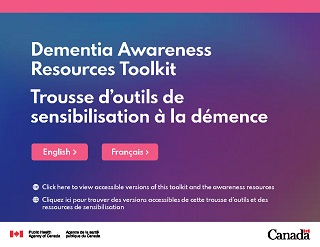Dementia: Overview
On this page
About dementia
Dementia is an umbrella term that describes a set of symptoms affecting brain function. It's a chronic condition that gets more severe over time and is often characterized by:
- a decline in:
- memory
- planning
- language
- judgement
- physical changes, like:
- loss of coordination
- loss of bladder control
- weak and stiff muscles
- trouble standing, sitting or walking
- changes in mood and behaviour
There are many different types of dementia, each with its own cause. We don't yet fully understand these causes, but researchers suspect that some may be:
- abnormal proteins in the brain
- reduced blood supply to the brain
- nerve cells in the brain that stop working properly
There's currently no cure for dementia, but some treatments may help to ease symptoms for some people and can help improve quality of life. The condition is not contagious.
About 3% of all people living with dementia in Canada are younger than age 65. This is known as young onset dementia. Since dementia is less common before age 65, it often goes unnoticed or undiagnosed. Living with young onset dementia comes with unique challenges because the person may be more likely to be:
- raising a family
- working full-time
- caring for aging parents
- seemingly fit and healthy
- carrying financial responsibilities
Each person experiences dementia and its impacts on daily life differently. You may still be able to remain active and engaged in your work, home life and other responsibilities after getting a diagnosis.
Find out about:
Dementia in Canada
In Canada between April 2022 and March 2023:
- close to 487,000 people aged 65 and older were living with diagnosed dementia
- close to 99,000 people aged 65 and older were newly diagnosed with dementia
These numbers only include people who have had a formal diagnosis from a health care provider and are aged 65 and older. As such, the number of people living with dementia in Canada may be higher.
We expect the number of people living with dementia to continue to increase as Canada's population ages. However, data shows that the rate of newly diagnosed cases in people aged 65 and older has been decreasing over the past 10 years. Taking into account the aging of the population over time, between April 2013 and March 2014 there were 1,472 new cases per 100,000 people in this age group. This decreased to 1,411 new cases per 100,000 between April 2022 and March 2023Footnote *.
Find out about:
- What Canada's doing
- Statistics on dementia in Canada (Canadian Chronic Disease Surveillance System)
Types of dementia
Many diseases, injuries and conditions can affect different parts of the brain in ways that may result in dementia. Some conditions like Huntington's disease, Creutzfeldt-Jakob disease and multiple sclerosis have been linked to dementia.
Starting with the most common, here are some types of dementia:
Alzheimer's disease
Early signs of Alzheimer's disease include minor memory issues, such as forgetting new information and having difficulty completing familiar tasks.
Vascular dementia
Vascular dementia is associated with problems with blood flow to the brain, which damages brain cells. Causes for vascular dementia may include:
- stroke
- brain aneurysm
- narrowed blood vessels
- other cerebrovascular conditions
Lewy body disease (dementia with Lewy bodies)
Lewy body disease is a neurodegenerative disease associated with abnormal proteins in the brain called Lewy bodies. These proteins are also observed in Alzheimer's and Parkinson's diseases, so some symptoms overlap. Lewy body disease can impact a person's ability to think and solve problems. It can also cause:
- tremors
- lack of balance
- slow movements
- sleep disturbances
- visual hallucinations
Memory loss usually develops later with Lewy body disease than it would with Alzheimer's.
Mixed dementia
Mixed dementia is when someone lives with 2 or more types of dementia. The most common form of mixed dementia consists of Alzheimer's disease and vascular dementia.
After being diagnosed with dementia, you or your health care provider may overlook the possibility of mixed dementia. This is sometimes the case for the types of dementia that are associated with similar symptoms. If you have any questions or concerns about being diagnosed with mixed dementia, talk to your health care provider.
Frontotemporal dementia
This type of dementia affects the frontal and temporal lobes of the brain. Damage to nerve cells in these areas can limit interactions with other parts of the brain. This type of dementia most often affects:
- behaviour
- personality
- movement
- communication
Korsakoff dementia (also called Korsakoff's syndrome)
Korsakoff dementia usually happens when someone's levels of vitamin B1 are severely low for a long time. This can cause:
- forgetfulness
- difficulty learning new information
- other common signs of dementia
Vitamin B1 deficiencies have many causes, including:
- problematic alcohol use
- poor nutrition
- dietary disorders
- some chemotherapy treatments
Find out about:
Related links
- Canadian Institute for Health Information: Dementia in Canada
- Indigenous Cognition & Aging Awareness Research Exchange: What is dementia? Indigenous perspectives and cultural understandings (PDF, 7.2 MB)
- iGeriCare: What is dementia? A lesson
- Alzheimer's Society of Canada: Rare types of dementia
- Forward with dementia: Understand types of dementia
- Forward with dementia: Progression of dementia
- World Health Organization: Dementia fact sheet
Footnote
- Footnote *
-
These statistics were influenced by the COVID-19 pandemic (from April 2020 to March 2023); as such the statistics for this period should be interpreted with caution.
